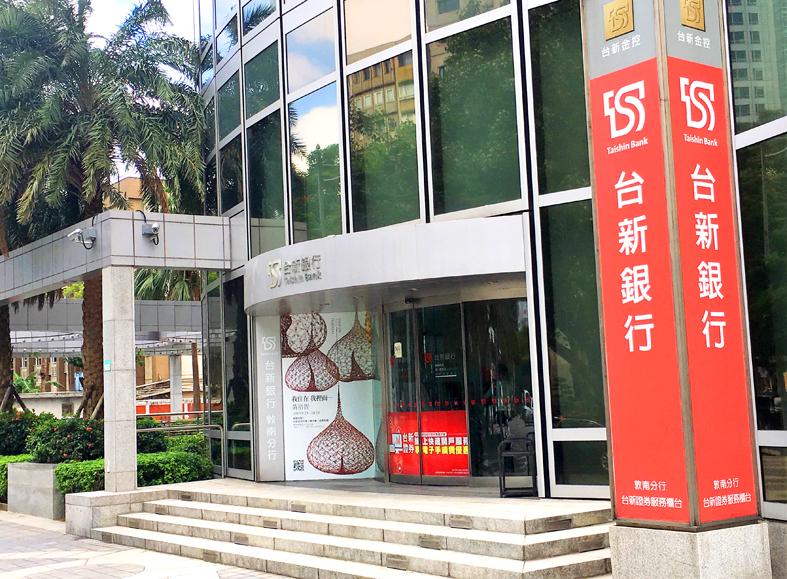The Financial Supervisory Commission (FSC) yesterday fined Taishin International Bank (台新銀行) a record NT$30 million (US$1.07 million) for oversight failure, after its staff stole NT$347 million from customers.
The fine was much higher than the penalty of NT$20 million handed to E.Sun Commercial Bank (玉山銀行) in November last year and the NT$12 million fine to Cathay United Bank (國泰世華銀行) in December last year for similar failures.
An E.Sun employee had stolen NT$140 million from 41 clients, while Cathay United Bank’s staff had stolen NT$17.32 million from four clients, data from the commission showed.

Photo: Wang Meng-lun, Taipei Times
Taishin Bank received the heaviest punishment not only because the NT$347 million its former employee stole from nine clients was the highest among all bank thefts, but also because the employee had done so for more than a decade, from 2008 to last year, indicating the bank’s lax internal controls, the commission said.
The former employee, a customer relationship manager surnamed Chou (周) at a branch in New Taipei City’s Jhonghe District (中和), asked his clients to sign blank transfer forms and then used them to transfer their money to the bank accounts of his friends or his sister, Banking Bureau Deputy Director-General Huang Kuang-hsi (黃光熙) told a videoconference.
Although some of Chou’s clients applied to reconcile their bank accounts, the bank failed to save the records of account activity for inspection, Huang said.
When the bank in 2019 discovered the suspicious cash movement, Chou’s manager only asked him to write a report, but failed to continue monitoring him, Huang added.
The commission also faulted Taishin’s management, saying the bank had cut the branch’s workforce and was overly focused on how much sales its employees could generate, he said.
“Sales had a weighting of 40 percent in an employee’s performance assessment in 2016... Although the weighting was lowered in the following years, it was still comparatively higher than at other banks,” he said.
That might explain why when Chou secretly moved funds from his clients to other accounts, those responsible for checking did not spot the illegal activity, Huang said.
The FSC suspended Taishin Bank’s deputy head of consumer banking, surnamed Lin (林), for three months, saying Lin was responsible for the poor management as he had designed the employee performance assessment, Huang said.

KEEPING UP: The acquisition of a cleanroom in Taiwan would enable Micron to increase production in a market where demand continues to outpace supply, a Micron official said Micron Technology Inc has signed a letter of intent to buy a fabrication site in Taiwan from Powerchip Semiconductor Manufacturing Corp (力積電) for US$1.8 billion to expand its production of memory chips. Micron would take control of the P5 site in Miaoli County’s Tongluo Township (銅鑼) and plans to ramp up DRAM production in phases after the transaction closes in the second quarter, the company said in a statement on Saturday. The acquisition includes an existing 12 inch fab cleanroom of 27,871m2 and would further position Micron to address growing global demand for memory solutions, the company said. Micron expects the transaction to

Vincent Wei led fellow Singaporean farmers around an empty Malaysian plot, laying out plans for a greenhouse and rows of leafy vegetables. What he pitched was not just space for crops, but a lifeline for growers struggling to make ends meet in a city-state with high prices and little vacant land. The future agriculture hub is part of a joint special economic zone launched last year by the two neighbors, expected to cost US$123 million and produce 10,000 tonnes of fresh produce annually. It is attracting Singaporean farmers with promises of cheaper land, labor and energy just over the border.

US actor Matthew McConaughey has filed recordings of his image and voice with US patent authorities to protect them from unauthorized usage by artificial intelligence (AI) platforms, a representative said earlier this week. Several video clips and audio recordings were registered by the commercial arm of the Just Keep Livin’ Foundation, a non-profit created by the Oscar-winning actor and his wife, Camila, according to the US Patent and Trademark Office database. Many artists are increasingly concerned about the uncontrolled use of their image via generative AI since the rollout of ChatGPT and other AI-powered tools. Several US states have adopted

A proposed billionaires’ tax in California has ignited a political uproar in Silicon Valley, with tech titans threatening to leave the state while California Governor Gavin Newsom of the Democratic Party maneuvers to defeat a levy that he fears would lead to an exodus of wealth. A technology mecca, California has more billionaires than any other US state — a few hundred, by some estimates. About half its personal income tax revenue, a financial backbone in the nearly US$350 billion budget, comes from the top 1 percent of earners. A large healthcare union is attempting to place a proposal before